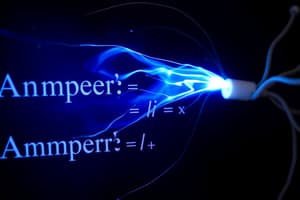Podcast
Questions and Answers
Under what condition does Ampere's law fail to accurately predict the magnetic field?
Under what condition does Ampere's law fail to accurately predict the magnetic field?
- When capacitors are charging or discharging (correct)
- When a circuit contains resistors
- When there is real current flowing through the loop
- When high-frequency currents are used
What phenomenon did Maxwell introduce to explain the discrepancies observed with Ampere's law?
What phenomenon did Maxwell introduce to explain the discrepancies observed with Ampere's law?
- Capacitive coupling
- Displacement current (correct)
- Magneto-electric coupling
- Conductive electric field
What is represented by the expression ε₀ (dΦ_E/dt) in the context of electromagnetism?
What is represented by the expression ε₀ (dΦ_E/dt) in the context of electromagnetism?
- Magnetic field strength
- Electric field intensity
- Displacement current (correct)
- Real current in a closed loop
What is the significance of the unit 'ampere' in relation to displacement current?
What is the significance of the unit 'ampere' in relation to displacement current?
Which of the following statements accurately describes the Ampere-Maxwell law?
Which of the following statements accurately describes the Ampere-Maxwell law?
What does the term 'displacement current' signify in electromagnetic theory?
What does the term 'displacement current' signify in electromagnetic theory?
Why is the magnetic field between the plates of a charging capacitor not zero, despite no real current flowing through that region?
Why is the magnetic field between the plates of a charging capacitor not zero, despite no real current flowing through that region?
What key advancement in electromagnetism did Maxwell's concept of displacement current facilitate?
What key advancement in electromagnetism did Maxwell's concept of displacement current facilitate?
Flashcards
Ampere's Law Limitations
Ampere's Law Limitations
Ampere's law, which states that the magnetic field circulation around a closed loop is proportional to the enclosed current, fails to predict magnetic fields in scenarios involving capacitors that are charging or discharging.
Capacitor Charging and Magnetic Fields
Capacitor Charging and Magnetic Fields
The electric field between the plates of a charging capacitor increases, leading to an increasing electric flux. Even though no real current flows between the plates, a magnetic field exists.
Maxwell's Displacement Current
Maxwell's Displacement Current
Maxwell proposed that a changing electric flux can create a magnetic field, similar to how changing magnetic flux creates an electric field (Faraday's law). This concept is represented by displacement current.
Displacement Current Equation
Displacement Current Equation
Signup and view all the flashcards
Ampere-Maxwell's Law
Ampere-Maxwell's Law
Signup and view all the flashcards
Significance of Displacement Current
Significance of Displacement Current
Signup and view all the flashcards
Unification of Electricity and Magnetism
Unification of Electricity and Magnetism
Signup and view all the flashcards
Units of Displacement Current
Units of Displacement Current
Signup and view all the flashcards
Study Notes
Ampere's Law Limitations
- Ampere's law, stating that the circulation of a magnetic field along a closed loop equals the product of the permeability of free space and the enclosed current, is not universally applicable.
- It fails to accurately predict magnetic fields in situations like charging or discharging capacitors.
Capacitor Charging and Magnetic Fields
- Capacitor charging increases the electric field and electric flux between its plates.
- Experiments show a non-zero magnetic field between the capacitor plates, despite no real current flowing there.
- Ampere's law predicts zero magnetic field in this situation, highlighting its inadequacy.
Maxwell's Contribution: Displacement Current
- Maxwell recognized that changing electric fluxes can induce magnetic fields, analogous to changing magnetic fluxes inducing electric fields (Faraday's law).
- This required another source of magnetic field beyond real currents.
- He introduced displacement current to amend Ampere's law.
- Displacement current equals ε₀ (dΦ_E/dt), where ε₀ is the permittivity of free space and dΦ_E/dt is the rate of change of electric flux.
Ampere-Maxwell's Law
- Ampere-Maxwell's law combines real current and displacement current.
- It states that the circulation of the magnetic field around a closed loop equals the sum of enclosed real current and displacement current through the surface bounded by the loop.
Significance of Displacement Current
- Displacement current is a theoretical concept explaining magnetic fields arising from changing electric fields, crucial where no real current exists.
- It connects electric and magnetic fields, showcasing their interdependence.
- The unit of displacement current is the ampere, similar to real current, indicating its contribution to the magnetic field.
- This concept unified electricity and magnetism, a significant advance in electromagnetism.
Studying That Suits You
Use AI to generate personalized quizzes and flashcards to suit your learning preferences.




